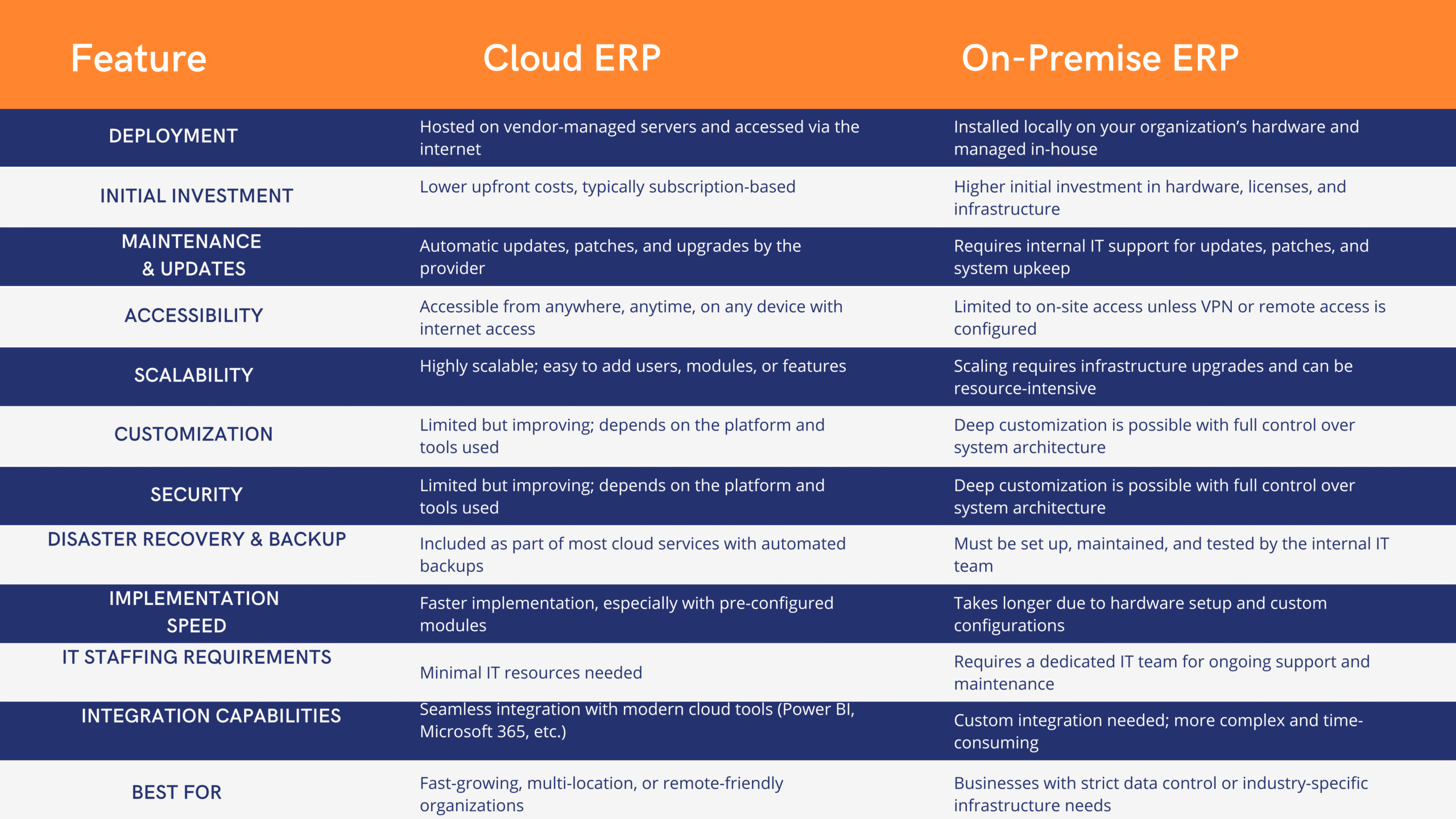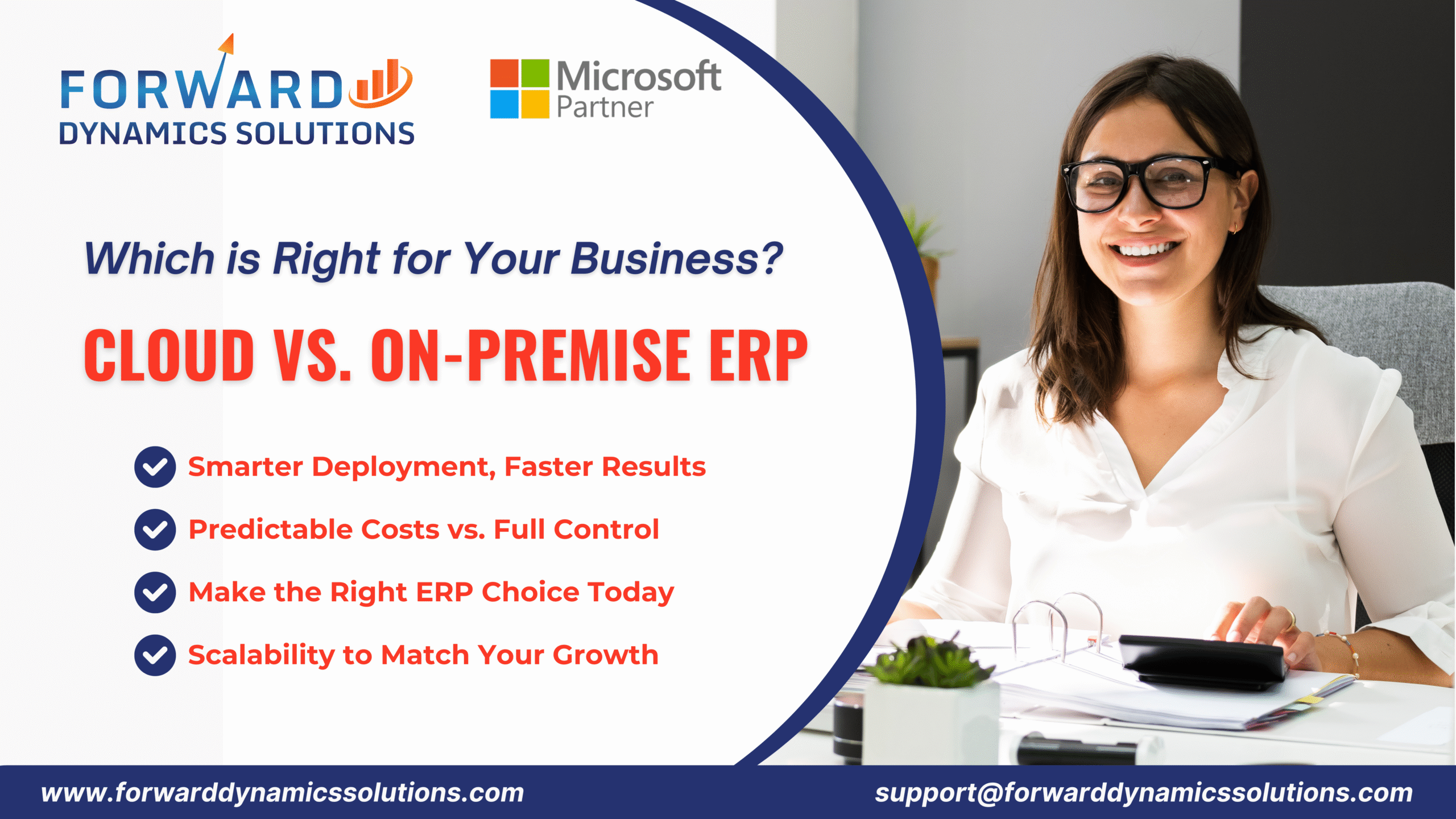“Transforming operations starts with making informed technology decisions.”
Selecting the right Enterprise Resource Planning (ERP) system is a defining step in every organization’s digital journey. The decision between a Cloud ERP solution and an On-Premise ERP system carries long-term implications for how your business handles operations, data, growth, and customer experience. With evolving market demands and the rise of hybrid work environments, more companies are weighing the strengths of these two approaches to find the best fit for their future.
A Cloud ERP offers unmatched flexibility, real-time access, and seamless updates without heavy infrastructure. It’s especially attractive for businesses aiming to scale quickly, support remote teams, or streamline IT maintenance. On the other hand, on-premises ERP solutions provide full control over data and customization, making them a strong option for companies with strict compliance needs or complex internal systems.
We understand that no two businesses are the same at Forward Dynamics Solutions. That’s why we focus on helping organizations find the ERP model that truly aligns with their goals, industry needs, and resources. In this guide, we’ll walk you through the differences between Cloud and On-Premise ERP, highlight the strengths of each, and provide a clear path toward confident decision-making for your next ERP investment.
Cloud vs. On-Premise ERP: Feature-by-Feature Comparison

How Does Cloud ERP Work in Modern Business Environments?
Cloud ERP runs on vendor-managed infrastructure and is accessible from anywhere through the internet. It provides flexibility, speed, and cost-efficiency for businesses that are scaling or operating across multiple locations.
- Low upfront investment: No need for expensive servers or hardware purchases. Most cloud ERP platforms run on a subscription model.
- Automatic updates and maintenance: Your ERP stays current with security patches, new features, and compliance tools without requiring internal IT teams.
- Remote access and real-time data: Cloud ERP offers seamless access to dashboards, reports, and workflows from any device, perfect for hybrid and remote teams.
- High scalability: Easily add users, features, or locations as your business expands, without system interruptions or high capital expense.
What Makes On-Premise ERP Solutions a Reliable Choice?
On-Premise ERP is installed locally on your company’s hardware and managed internally. It suits businesses that prioritize total control over their data and systems.
- Full system control and ownership: Organizations can tailor every part of the ERP to meet strict compliance or operational standards.
- Custom integrations and configurations: On-premise systems allow greater customization, ideal for businesses with unique or legacy processes.
- Internal data security oversight: Enterprises with sensitive information can manage their firewalls, backups, and encryption.
- Upfront investment with long-term ROI: Although initial costs are higher, companies avoid ongoing subscription fees and may achieve savings over time.
What Key Factors Help Decide Between Cloud and On-Premise ERP?
Understanding your priorities and resources is essential. Each ERP model offers unique advantages depending on your organization’s needs, infrastructure, and regulatory environment.
- Deployment speed and flexibility: Cloud ERP solutions deploy faster and require less internal effort, ideal for fast-moving industries.
- Budget and cost planning: Consider if your preference leans toward predictable subscription-based expenses or one-time capital investment.
- Security and compliance: Evaluate how critical it is to keep data onsite versus leveraging the security expertise of cloud providers.
- IT support availability: Cloud options reduce dependency on internal IT teams, while on-premise models require consistent in-house support.
Which ERP Model Scales Better for Growing Enterprises?
Scalability plays a vital role in your ERP strategy. Businesses anticipating rapid change often lean toward cloud solutions due to their agility.
- Multi-location support: Cloud ERP excels for distributed teams or companies entering new markets quickly.
- Add-on modules and upgrades: Scaling in the cloud is as simple as turning on features—no need for reinstallations or major migrations.
- User expansion: Easily increase user licenses without hardware concerns or performance issues.
- Global accessibility: Cloud systems allow users in any location to collaborate securely and in real-time.
How Do Cloud and On-Premise ERP Impact Operational Efficiency?
Operational workflows benefit differently from each ERP model. Cloud solutions support continuous improvement, while on-premise systems favor stability and control.
- Automation and AI integration: Cloud ERP systems evolve faster with features like Microsoft Copilot, Power BI dashboards, and low-code Power Apps.
- Performance optimization: Cloud environments auto-scale based on usage, while on-premise performance requires hardware upgrades.
- Uptime and disaster recovery: Cloud vendors ensure high availability and rapid disaster recovery with minimal manual intervention.
Why Do Microsoft-Centric Organizations Prefer Cloud ERP?
Businesses using Microsoft Dynamics 365, Power Platform, or Azure often find cloud ERP systems more aligned with their digital roadmap.
- Native integration with Microsoft apps: Seamlessly connect ERP with Teams, Outlook, Excel, SharePoint, and more.
- Unified user experience: Cloud platforms offer a consistent UX across ERP, CRM, and productivity tools.
- Security built on Azure: Enterprise-grade cloud security includes identity management, encryption, and access control.
How Does Forward Dynamics Solutions Support ERP Transformation?
At Forward Dynamics Solutions, we specialize in helping organizations modernize with the right ERP model—cloud, on-premise, or hybrid. With deep expertise in Microsoft Dynamics 365, Azure, and Power Platform, we support your entire ERP journey—from planning and migration to customization and security.
Our ERP Services Include:
- Cloud ERP consulting and migration
- On-premise ERP assessments and upgrades
- Microsoft Dynamics 365 implementations
- Power Platform integration for low-code apps and automation
- Industry-specific digital transformation strategies
Making the Right ERP Choice Starts with Clarity
Choosing between Cloud ERP and On-Premise ERP isn’t just about technology—it’s about aligning your systems with your business vision. Both models offer powerful advantages when matched to the right environment, goals, and infrastructure. A cloud-based ERP supports speed, flexibility, and growth. An on-premise ERP brings control, customization, and long-term value.
At Forward Dynamics Solutions, we help businesses like yours find clarity in complexity. Whether you’re exploring ERP for the first time or planning a system upgrade, our team will guide you with proven strategies, industry expertise, and future-focused thinking.
Let’s build the ERP foundation that fits where your business is today—and where it’s heading tomorrow. Ready to move forward? Connect with us to begin your ERP journey with confidence.

